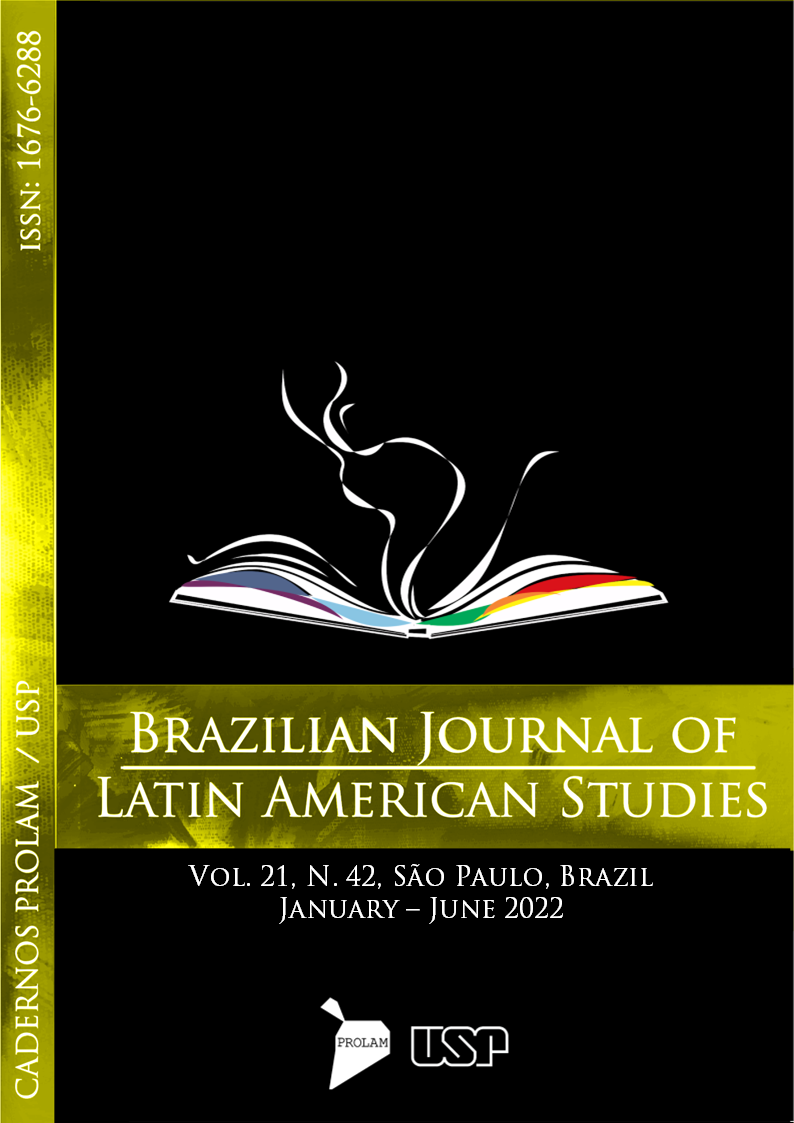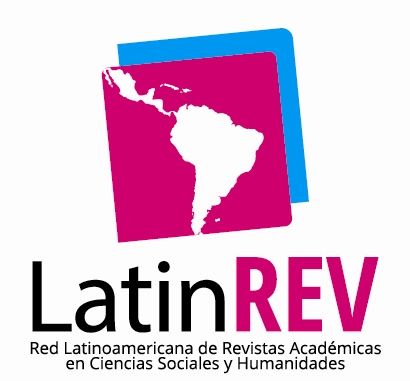Aspectos da migração síria para a Argentina: análise segundo o modelo teórico-analitico de Eva Gugenberger para a linguística da migração
DOI:
https://doi.org/10.11606/issn.1676-6288.prolam.2022.194201Palavras-chave:
Eva Gugenberger, Linguística da migração, migração síria, ArgentinaResumo
Este artigo aborda o modelo teórico-analítico para a linguística da migração proposto por Eva Gugenberger, em consonância com a última migração síria ocorrida na Argentina entre os anos de 2011-2020. O objetivo principal deste trabalho é analisar a migração síria na Argentina segundo alguns aspectos escolhidos a partir do modelo de Eva Gugenberger, inicialmente aplicado à migração galega na Argentina, através do qual obteve dados relevantes sobre a cultura estudada. Instrumentos legais como a Lei 25.871 e o chamado Programa Sírio são utilizados para esta pesquisa, o que permite melhor compreensão da forma como os migrantes sírios estão inseridos socialmente na Argentina. Este artigo visa não apenas fornecer um olhar a partir dos estudos migratórios, mas também colocá-los em diálogo com a sociolinguística. Em relação à metodologia utilizada, é preciso destacar que é de abrangência qualitativa e descritiva, voltada para o estudo da legislação nacional, dos programas criados para atender os migrantes sírios, etc. Da mesma forma, são utilizados artigos e livros especializados na área estudada. Por fim, entre os resultados mais destacados está que o modelo proposto por Gugenberger pode de fato ser aplicado a outros processos migratórios diferentes daquele que ela inicialmente estudou.
Downloads
Referências
BBC MUNDO (2018). 7 preguntas para entender el origen de la guerra en Siria que lleva años desangrando al país. Disponible en: https://www.bbc.com/mundo/noticias-internacional-37451282 . Consultado en: 27 mar. 2022.
BÉRODOT, Solène; POZZO, María Isabel. Historia de la inmigración sirio-libanesa en Argentina desde la perspectiva compleja del métissage. Aportes para una educación intercultural. Lyon: Ince-Conicet, 2011. Disponible en: https://ri.conicet.gov.ar/bitstream/handle/11336/51570/CONICET_Digital_Nro.25398.pdf?sequence=1&isAllowed=y . Consultado en: 31 ago. 2020.
BERRY, John. Psychology of Acculturation. In: BERMAN, John (ed.), Nebraska Symposium on Motivation, Lincoln (USA): University of Nebraska Press, 1990. p. 201-234.
BERTONI, Lilia Ana. La inmigración sirio-libanesa en América Latina. De Turquía a Buenos Aires. Una colectividad nueva a fines del siglo XIX. Estudios Migratorios Latinoamericanos, n. 26, pp. 67-94, 1994.
DEVOTO, Fernando. Historia de la inmigración en la Argentina. Buenos Aires: Editorial Sudamericana, 2003.
GARCÍA, Lila; NEJAMKIS, Lucila. Regulación migratoria en la Argentina actual: del “modelo” regional al recorte de derechos de Autoctonía. Revista de Ciencias Sociales e Historia, v. II, n. 2, jul. / dic. 2018, pp. 219-241. DOI: https://doi.org/10.23854/autoc.v2i2.55 Consultado en: 3 sept. 2020.
GUGENBERGER, Eva. Aculturación e hibrididad lingüísticas en la migración: Propuesta de un modelo teórico-analítico para la lingüística de la migración. Revista Internacional de Lingüística Iberoamericana, n. 2 (10), v. 5, Lengua y migración en el mundo hispanohablante, pp. 21-45, 2007. Disponible en: https://www.jstor.org/stable/41678299 Consultado en: 24 mar. 2021.
GUGENBERGER, Eva. Lengua y emigración: Dos factores aceleradores del desplazamiento de la lengua gallega en Buenos Aires. Iberoamericana (1977-2000), n. 4 (80), v. 24, 2000a, pp. 43–67. Disponível em: http://www.jstor.org/stable/41671865 . Consultado en: 14 jun. 2022
GUGENBERGER, Eva. Identidad, conflicto lingüístico y asimilación: observaciones acerca de la lengua gallega en Buenos Aires. In: NÚÑEZ SEIXAS, Xosé M. (ed.): Galicia austral. Buenos Aires: Biblos, 2000b.
INDEC (Instituto Nacional de Estadística y Censo de la República de Argentina). Cuadro P6. Total del país. Población total nacida en el extranjero por lugar de nacimiento, según sexo y grupos de edad. In: Censo 2010. 2010. Disponible en: http://www.cslp.com.ar/uploads/files/1f690c_poblacion%20extranjera%20censo%202010%20(1).pdf . Consultado en: 22 mar. 2021.
INFOLEG (Información Legislativa). Migraciones: Ley 25.871. Buenos Aires: Ministerio de Justicia y Derechos Humanos, Presidencia de la Nación, 2020. Disponible en: http://servicios.infoleg.gob.ar/infolegInternet/anexos/90000-94999/92016/texact.htm Consultado en: 28 ago. 2020.
INFOLEG (Información Legislativa). Programa Siria: Programa especial de visado humanitario para extranjeros afectados por el conflicto de la República árabe de Siria. 2016. Disponible en: http://servicios.infoleg.gob.ar/infolegInternet/anexos/265000-269999/265236/texact.htm . Consultado en: 30 ago. 2020.
KLEIDERMACHER, Gisele. Perfil sociocultural de la población siria en origen. Buenos Aires: OIM, 2018. Disponible en: https://www.argentina.gob.ar/sites/default/files/perfil_sociocultural_de_la_poblacion_siria_en_origen.pdf . Consultado en: 14 jun. 2022.
YAÑEZ MORETTA, Patricio. El proceso de aprendizaje: fases y elementos fundamentales. Revista San Gregorio, n. 11, v. 1, ene. / jun. 2016, pp. 70-81. DOI: http://dx.doi.org/10.36097/rsan.v1i11.19 . Consultado en: 28 mar. 2022.
Downloads
Publicado
Edição
Seção
Licença
Copyright (c) 2022 Carolina Y. Andrada-Zurita

Este trabalho está licenciado sob uma licença Creative Commons Attribution-NonCommercial 4.0 International License.
A BJLAS adota a política de Acesso Livre (Libre Open Access), sob o acordo padrão Creative Commons (CC BY-NC 4.0). O acordo prevê que:
- A submissão de texto autoriza sua publicação e implica compromisso de que o mesmo material não esteja sendo submetido a outro periódico. O original é considerado definitivo;
- Autores mantêm os direitos autorais e concedem à revista o direito de primeira publicação, com o trabalho simultaneamente licenciado sob a Licença Creative Commons Attribution (CC BY-NC 4.0).
- Autores têm autorização para assumir contratos adicionais separadamente, para distribuição não-exclusiva da versão do trabalho publicada nesta revista (ex.: publicar em repositório institucional ou como capítulo de livro), com necessário reconhecimento de autoria e publicação inicial nesta revista;
- Autores têm permissão e são estimulados a publicar e distribuir seu trabalho online (ex.: em repositórios institucionais, repositórios específicos, ou na sua página pessoal) após o processo editorial, já que isso pode gerar alterações produtivas, bem como aumentar o impacto e a citação do trabalho publicado (Veja O Efeito do Acesso Livre).
- O detentor dos direitos autorais da revista, exceto os já acordados no acordo sob a Licença Creative Commons Attribution (CC BY-NC 4.0), é o Programa de Pós-graduação Integração da América Latina.
É permitida a cópia, reprodução e distribuição de textos, imagens, dados e demais arquivos, no todo ou em parte, em qualquer formato ou meio, desde que sejam observadas as regras da licença Creative Commons (CC BY-NC 4.0):
- O uso do material copiado e ou reproduzido no todo ou em partes deve se destinar apenas a fins educacionais, de pesquisa, uso pessoal ou outros usos não comerciais. Reproduções para fins comerciais são proibidas;
- O material pode ser copiado e redistribuído em qualquer suporte ou formato;
- A reprodução deverá ser acompanhada da citação da fonte na integra incluindo o(s) nome(s) do(s) aturoes(s), no seguinte formato: Fonte: Revista Cadernos Prolam/USP. Brazilian Journal of Latin American Studies;
- Os nomes e endereços informados na revista serão usados exclusivamente para os serviços prestados por esta publicação, não sendo disponibilizados para outras finalidades ou a terceiros.













